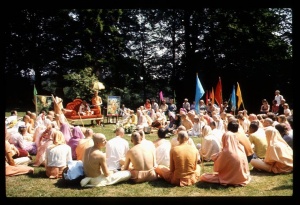CC Antya 10.100 (1975): Difference between revisions
(Vanibot #0027: CCMirror - Mirror CC's 1996 edition to form a basis for 1975) |
(Vanibot #0020: VersionCompareLinker - added a link to the Version Compare feature) |
||
| Line 2: | Line 2: | ||
<div style="float:left">'''[[Sri Caitanya-caritamrta (1975)|Śrī Caitanya-caritāmṛta (1975)]] - [[CC Antya (1975)|Antya-līlā]] - [[CC Antya 10 (1975)|Chapter 10: Śrī Caitanya Mahāprabhu Accepts Prasādam from His Devotees]]'''</div> | <div style="float:left">'''[[Sri Caitanya-caritamrta (1975)|Śrī Caitanya-caritāmṛta (1975)]] - [[CC Antya (1975)|Antya-līlā]] - [[CC Antya 10 (1975)|Chapter 10: Śrī Caitanya Mahāprabhu Accepts Prasādam from His Devotees]]'''</div> | ||
<div style="float:right">[[File:Go-previous.png|link=CC Antya 10.99 (1975)|Antya-līlā 10.99]] '''[[CC Antya 10.99 (1975)|Antya-līlā 10.99]] - [[CC Antya 10.101 (1975)|Antya-līlā 10.101]]''' [[File:Go-next.png|link=CC Antya 10.101 (1975)|Antya-līlā 10.101]]</div> | <div style="float:right">[[File:Go-previous.png|link=CC Antya 10.99 (1975)|Antya-līlā 10.99]] '''[[CC Antya 10.99 (1975)|Antya-līlā 10.99]] - [[CC Antya 10.101 (1975)|Antya-līlā 10.101]]''' [[File:Go-next.png|link=CC Antya 10.101 (1975)|Antya-līlā 10.101]]</div> | ||
{{CompareVersions|CC|Antya 10.100|CC 1975|CC 1996}} | |||
{{RandomImage}} | {{RandomImage}} | ||
==== TEXT 100 ==== | ==== TEXT 100 ==== | ||
| Line 32: | Line 31: | ||
<div class="purport"> | <div class="purport"> | ||
Karmīs, fruitive workers, cannot understand the finer conclusions of devotional service because they accept only its ritualistic value but do not understand how devotional service satisfies the Supreme Personality of Godhead. The karmīs view the formalities as a means of advancing in religion, economic development, sensual satisfaction and liberation. Although these are only material results of following religious principles, the karmīs consider them everything. Such ritualistic activities are called karma. Karmīs who adopt devotional service very loosely and who therefore remain on the platform of material activities are called prākṛta-sahajiyās. They cannot understand how pure devotional service is rendered in | Karmīs, fruitive workers, cannot understand the finer conclusions of devotional service because they accept only its ritualistic value but do not understand how devotional service satisfies the Supreme Personality of Godhead. The karmīs view the formalities as a means of advancing in religion, economic development, sensual satisfaction and liberation. Although these are only material results of following religious principles, the karmīs consider them everything. Such ritualistic activities are called karma. Karmīs who adopt devotional service very loosely and who therefore remain on the platform of material activities are called prākṛta-sahajiyās. They cannot understand how pure devotional service is rendered in paternal and conjugal love, for this can be understood only by the special mercy bestowed by Śrī Caitanya Mahāprabhu upon pure devotees. | ||
</div> | </div> | ||
Latest revision as of 20:38, 26 January 2020

A.C. Bhaktivedanta Swami Prabhupada
TEXT 100
- ei saba haya bhakti-śāstra-sūkṣma marma
- caitanyera kṛpāya jāne ei saba dharma
SYNONYMS
ei saba—all these; haya—are; bhakti-śāstra—of the system of devotional service; sūkṣma marma—finer principles; caitanyera kṛpāya—by the mercy of Śrī Caitanya Mahāprabhu; jāne—one can understand; ei saba—all these; dharma—principles of devotional service.
TRANSLATION
These are some of the finer points of etiquette in devotional service. Only one who has received the mercy of Śrī Caitanya Mahāprabhu can understand these principles.
PURPORT
Karmīs, fruitive workers, cannot understand the finer conclusions of devotional service because they accept only its ritualistic value but do not understand how devotional service satisfies the Supreme Personality of Godhead. The karmīs view the formalities as a means of advancing in religion, economic development, sensual satisfaction and liberation. Although these are only material results of following religious principles, the karmīs consider them everything. Such ritualistic activities are called karma. Karmīs who adopt devotional service very loosely and who therefore remain on the platform of material activities are called prākṛta-sahajiyās. They cannot understand how pure devotional service is rendered in paternal and conjugal love, for this can be understood only by the special mercy bestowed by Śrī Caitanya Mahāprabhu upon pure devotees.